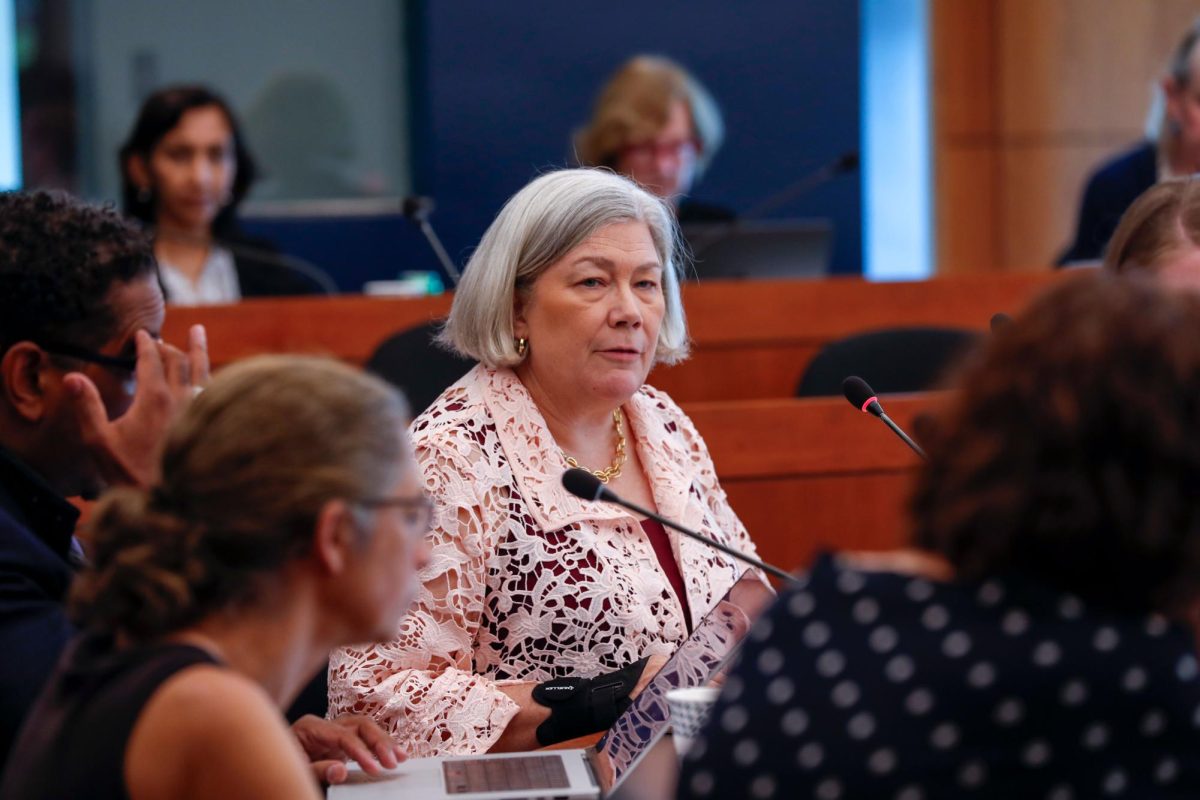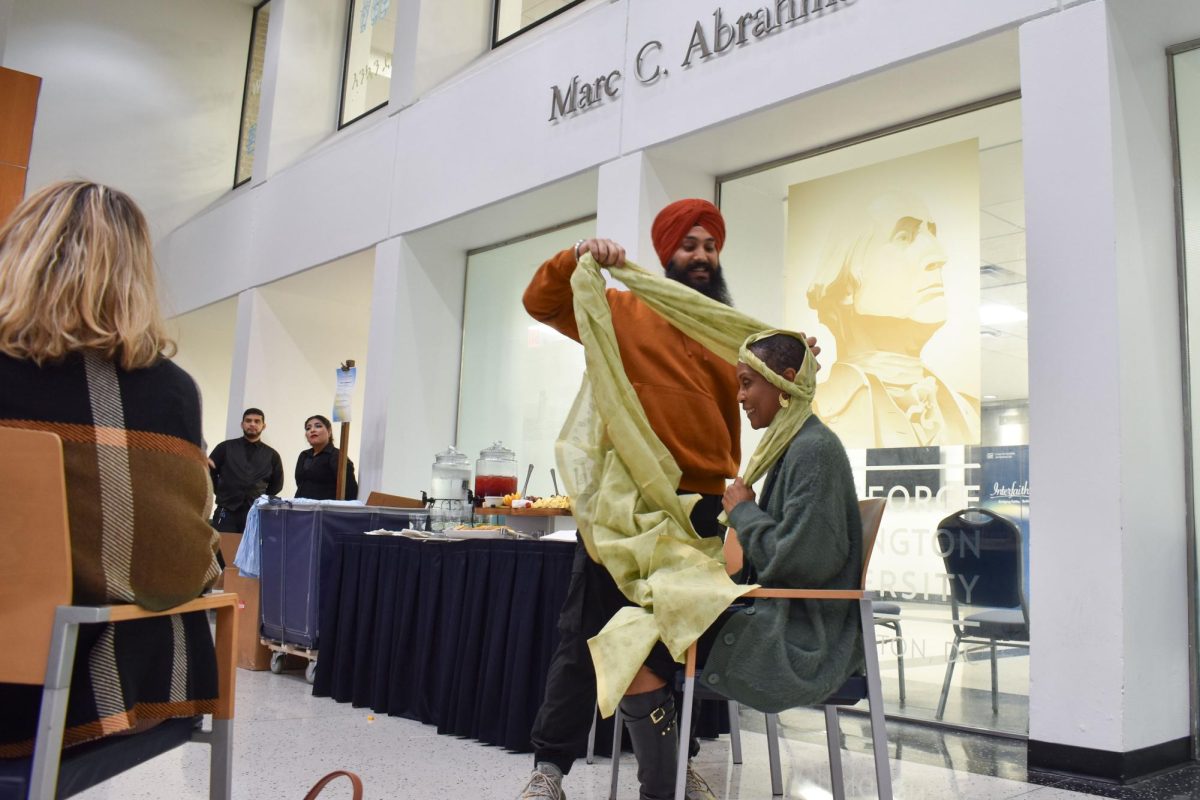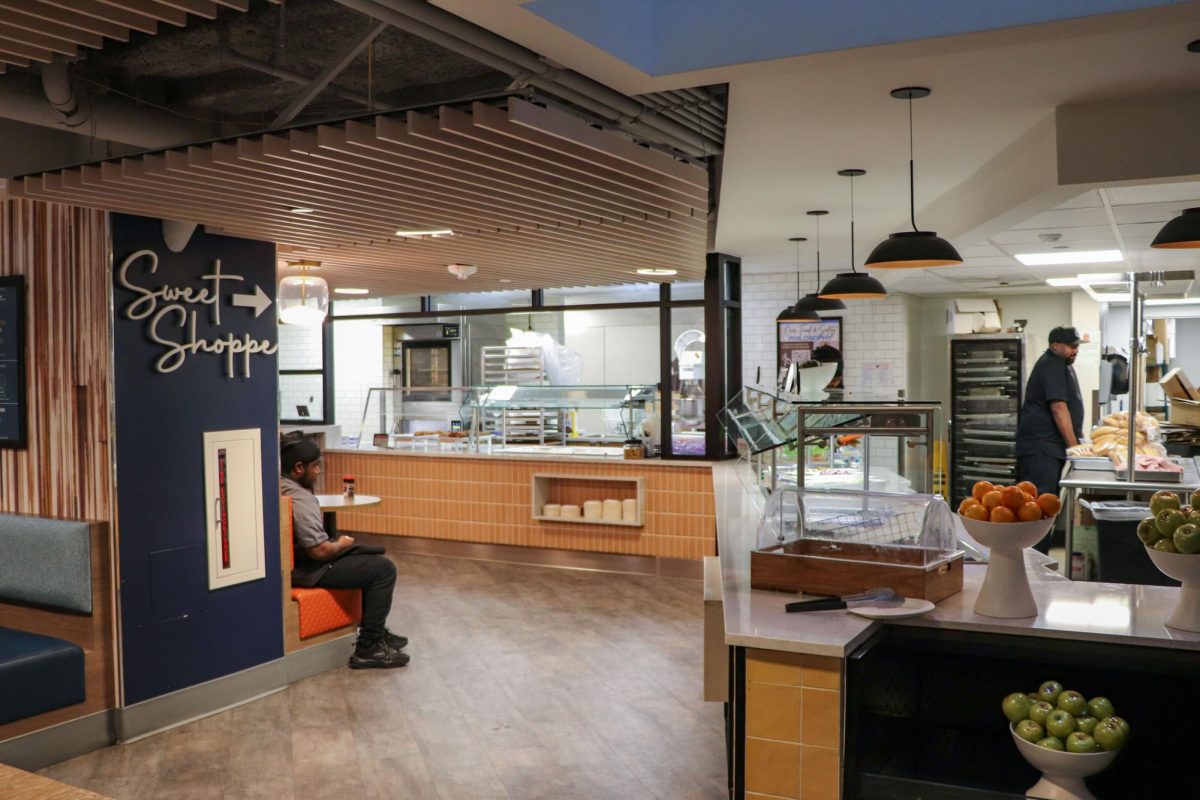Updated: Jan. 28, 2024, at 10:04 p.m.
Officials unveiled a plan to cultivate “productive” conversations and review free speech policies to the GW community Thursday, a response to flaring on-campus tensions due to the war in the Gaza Strip.
University President Ellen Granberg and Provost Chris Bracey unveiled a three-part plan that outlines educational programming for handling university life during times of conflict, support for those affected by the war in Gaza and doxxing victims, and officials’ intent to review free speech and conduct policies in the “coming months.” The plan comes after students criticized free speech policies at the University in the fall semester following student demonstrations about the war in Gaza and the suspension of a pro-Palestinian student group in November.
Granberg and Bracey said conversations with students, staff, faculty, alumni and GW “partners” informed the comprehensive plan’s creation. They added that the plan is a starting point to develop free expression on campus and will be updated. They did not specify what that would look like.
“On campus, a rise in antisemitism and Islamophobia has underscored the need for safer and more supportive campus environments,” Granberg and Bracey said in the joint email. “Amid these heightened tensions, the university’s commitment to academic freedom and the protection of free speech has been put to the test.”
Officials will soon review policies that pertain to campus demonstrations, disruptions of University functions, and the location, time and manner of “free speech activities” in accordance with GW free speech guidelines, the plan states. Granberg said earlier this month that the University’s free speech regulations are not “harmonized” and that officials may amend the Code of Student Conduct to ensure consistency among all expression policies.
Granberg’s plan to provide guidance on the allowed time and place of demonstrations follows other higher education institutions’ policy amendments. Columbia University updated its event policy to allow officials to regulate the location, time and manner of demonstrations after suspending Students for Justice in Palestine and Jewish Voice for Peace, and hundreds of students and faculty protested the suspension of SJP and JVP after an official said the groups violated university event policies.
Faculty Senate Executive Committee Chair Ilana Feldman said at a Faculty Senate meeting in December that officials should reaffirm their commitment to free speech after “recent actions” could suggest that freedom of expression is threatened.
Students marched in the streets of Foggy Bottom in November accusing officials of silencing pro-Palestinian voices after officials suspended Students for Justice in Palestine. Officials prohibited the group from organizing on-campus activities for 90 days due to their projection of anti-Israel messages onto Gelman Library in October.
The plan’s free expression section states officials may regulate speech when it is obscene, involves true threats or prohibited identity-based harassment or disrupts University operations and threatens or endangers others. The Guidelines for Exercising and Defending Academic Freedom, which officials adopted in 2018, prohibits University community members from engaging in speech that is threatening or violates the law.
“Unlike other large complex organizations in our society, colleges and universities are laboratories for social and intellectual growth; activism, engagement, and freedom of expression are essential for these things,” the plan states. “This freedom extends to students and faculty and encompasses diverse viewpoints, including those that are objectionable or offensive to some. Free expression, however, is not unlimited.”
Officials will also reevaluate reporting processes for bias, discrimination and harassment to increase its “clarity, accessibility and usefulness.” Officials will also assess shared guidance adapted from the Columbia University Office of University Life to support those impacted by doxxing and online abuse.
The plan states that these measures will supplement bolstered safety measures, like additional security officers and police presence, implemented last semester in response to ongoing activism in the District.
In December, officials began to provide affinity spaces for those affected by the war and partner with the Student Association’s Council of Jewish and Israeli Student Experience and Council of Palestinian and Muslim Student Experience to voice student demands for protection against discrimination and support to administration.
The updates were a response to growing, visible instances of discrimination on campus. Palestinian and Muslim students called on officials for protection against acts of Islamophobia in November after at least four students reported that unknown people ripped off their hijabs on campus. Students also reported that more than a dozen posters of Israeli hostages were torn down from the GW Hillel building in November, leading the University to temporarily suspend and remove the student accused of removing the posters days later.
The plan states that officials intend to continue educational programming launched at New Student Orientation in the fall that explores “salient topics” like antisemitism, Islamophobia and navigating the Israeli-Palestinian conflict.
Officials will also hold an installment of the Sesno Series about conflict resolution in February, and the Office of the President and the Office for Diversity, Equity and Community Engagement will relaunch the Interfaith Dinner — which officials paused after the onset of the COVID-19 pandemic — to unite the student body and celebrate religious diversity.
The Division for Student Affairs will also be “redoubling” its religious programming to deepen students’ understanding of each other, with plans to host celebrations for Ramadan, Eid al-Fitr and Passover, and partner with the Washington National Cathedral for programming. GW Law will host a panel discussion with guests from GW and the Universities of Notre Dame and North Carolina to discuss free speech on college campuses Feb. 12.
“The coexistence of different faiths contributes to a vibrant campus, fosters greater understanding, and helps our students thrive in their academic and personal pursuits,” the plan states.
Officials from the Office of the Provost and the DSA will also consult faculty and students on how to handle “difficult topics” in the classroom and reaffirm their commitment to academic freedom.
“This is the beginning of a process to learn more from faculty and students about their expectations of what it looks like to teach and learn in a world-class academic environment,” the plan states.
This post was updated to include the following:
The Hatchet updated this post to include additional context about the national and campus tensions that preceded the plan.





